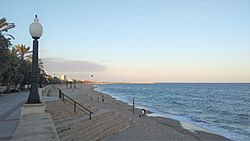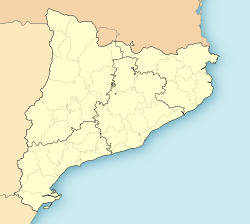Comarruga facts for kids
Quick facts for kids
Coma-ruga
|
|
|---|---|
|
Coastal Resort Town
|
|

Coma-ruga Beach
|
|
| Country | |
| Community | |
| Province | Tarragona |
| Comarca | Baix Penedès |
| Elevation | 0 m (0 ft) |
| Population
(2015)
|
|
| • Total | 4,074 |
Coma-ruga is a fun seaside town in Catalonia, Spain. It's part of the El Vendrell area in the Tarragona province. This town is famous for its beautiful beach, which is about 2.3 kilometers (1.4 miles) long!
Before 1946, Coma-ruga was part of a different town called Sant Vicenç de Calders.
Contents
Where is Coma-ruga?
Coma-ruga is located on the eastern side of the Costa Dorada, which means "Golden Coast." It's about 55 kilometers (34 miles) west of Barcelona-El Prat Airport. You'll find it close to other popular places like Calafell and Torredembarra.
This town became a popular spot for tourists, especially families, in the 1950s and 1960s. Its main draw is a lovely beach with golden sand that stretches for over 2 kilometers (1.2 miles).
What's the Weather Like?
Coma-ruga has a typical Typical Mediterranean climate. This means it has mild winters and hot summers. The most rain usually falls in the autumn, while summer is the driest time of year. The area gets more than 2,500 hours of sunshine each year, which is a lot!
| Climate data for Coma-ruga | |||||||||||||
|---|---|---|---|---|---|---|---|---|---|---|---|---|---|
| Month | Jan | Feb | Mar | Apr | May | Jun | Jul | Aug | Sep | Oct | Nov | Dec | Year |
| Mean daily maximum °C (°F) | 13 (55) |
14 (57) |
15 (59) |
17 (63) |
20 (68) |
24 (75) |
27 (81) |
27 (81) |
25 (77) |
21 (70) |
16 (61) |
13 (55) |
19.3 (66.7) |
| Mean daily minimum °C (°F) | 4 (39) |
5 (41) |
6 (43) |
8 (46) |
11 (52) |
15 (59) |
18 (64) |
19 (66) |
16 (61) |
12 (54) |
8 (46) |
5 (41) |
10.6 (51.1) |
| Average precipitation mm (inches) | 40 (1.6) |
35 (1.4) |
50 (2.0) |
47 (1.9) |
57 (2.2) |
41 (1.6) |
25 (1.0) |
50 (2.0) |
69 (2.7) |
84 (3.3) |
54 (2.1) |
44 (1.7) |
596 (23.5) |
| Average precipitation days (≥ 1 mm) | 12 | 11 | 11 | 11 | 11 | 8 | 5 | 8 | 8 | 10 | 11 | 12 | 118 |
| Mean monthly sunshine hours | 155 | 168 | 186 | 210 | 248 | 270 | 310 | 279 | 210 | 186 | 150 | 155 | 2,527 |
| Source: weather2travel | |||||||||||||
A Look at Coma-ruga's History
The first time Coma-ruga was mentioned in writing was in 1180. Back then, a leader from the Monastery of Sant Cugat gave some land to a person named Arnau Sunyer i Berenguer. This land was called "ipsum vilare de Coma Ruga."
Later, in 1183, the monastery gave more rights to Bernat de Papiol. He promised to protect the monastery's land and the people living there.
The Train Station and Its Impact
In 1887, the train station of Sant Vicenç de Calders was built in Coma-ruga. Over time, this station became a very important railway hub in Catalonia. Because of the station, a small neighborhood grew around it, mostly for railway workers and their families.
During the Spanish Civil War, the station was attacked several times. In late 1938, during the Christmas holidays, Coma-ruga was bombed heavily, causing many injuries and deaths.
The Healing Waters
In 1892, the hot springs in the pond and small creek (called riuet) of Coma-ruga were officially recognized for their health benefits. This was decided by the Royal Academy of Medicine and Surgery of Barcelona.
In 1920, a hotel and spa were built near the pond. This was the start of Coma-ruga's growth as a town. By the 1960s and 1970s, it had become a major tourist destination.
People and Languages
How Many People Live Here?
In 2015, the population of Coma-ruga was 4,074 people.
What Languages Are Spoken?
The two official languages in Coma-ruga are Spanish and Catalan. The local government mostly uses Catalan, and public signs are usually in Catalan. However, Spanish is very common for business and is spoken by most residents and visitors.
Many young people in Coma-ruga also know some English. If you work in tourism, you might also speak other languages like French, Dutch, or Russian.
Religion
There is a Roman Catholic church in Coma-ruga, which was built between 1956 and 1957. Church services are held in both Spanish and Catalan.
Getting Around Coma-ruga
Transportation Options
- Air Travel: Barcelona–El Prat Airport is about 56 kilometers (35 miles) east of Coma-ruga. You can catch a train from Sant Vicenç de Calders station to Barcelona-Sants every 30 minutes, which connects to the airport.
- Train Travel: Coma-ruga's train station (officially called Sant Vicenç de Calders) is mainly used by local commuter trains. Most of the day, there are 3 trains per hour to Barcelona and 1-2 trains to Tarragona.
- High-Speed Train: The Camp de Tarragona railway station is 33 kilometers (20 miles) west. This station is for high-speed trains (called AVE) that travel between Barcelona and Madrid.
- Motorways: Coma-ruga is connected by three main motorways:
- AP-2 goes to Zaragoza and then to Madrid.
- AP-7 stretches from the French border all the way to Vera.
- C-32 (Autopista Pau Casals) goes along the coast to Barcelona–El Prat Airport and Barcelona.
Healthcare
The closest hospital, Hospital Comarcal del Vendrell, is located in El Vendrell, about 8 kilometers (5 miles) northeast of Coma-ruga.
Fun Things to Do and See
Tourist Information
If you need help or information, the Tourist Information Office is located at Av. Brisamar, 1.
Nearby Places to Explore
- Vil·la Casals: This is the house-museum of the famous cellist Pau Casals. It's about 2.5 kilometers (1.5 miles) east.
- Arc de Berà: A Roman arch from the 1st century BC, about 6.6 kilometers (4 miles) west.
- Scipions Tower: Another Roman structure from the 1st century BC, 21 kilometers (13 miles) west.
- Les Ferreres Aqueduct: Also known as Devil's Bridge, this Roman aqueduct is about 30 kilometers (18.6 miles) west.
- Tarragona: The ancient Roman ruins of Tarraco (Tarragona's old name) are a World Heritage Site recognized by UNESCO. You can also visit the Cathedral, which mixes Romanesque and Gothic styles. It's 31 kilometers (19 miles) west.
- Santes Creus Monastery: A beautiful Gothic-style monastery from the 12th-13th century, located 35 kilometers (21.7 miles) northwest.
Coma-ruga Marina
The Coma-ruga Marina was built in 1976. It's managed by the Club Nàutic Coma-ruga, where you can see boats and enjoy the harbor.
Images for kids
See also
 In Spanish: Comarruga para niños
In Spanish: Comarruga para niños
 | Aurelia Browder |
 | Nannie Helen Burroughs |
 | Michelle Alexander |







